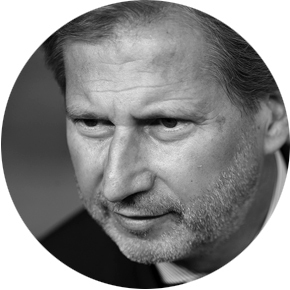Mediamax’s exclusive interview with Commissioner for European Neighbourhood Policy and Enlargement Negotiations Johannes Hahn
You will visit Armenia on January 29 and meet with President Armen Sarkissian and Prime Minister Nikol Pashinyan.What are the primary issues to be discussed during these meetings?
I am pleased to meet Prime Minister Pashinyan and President Sarkissian following the recent parliamentary elections in December. The new Government received a solid mandate to deliver on its commitment to reforms. I look forward to building a new and ambitious chapter in EU-Armenia relations.
In this context, I plan to discuss Government’s priorities and the reform agenda. Expectations of the new government are high and now is the time to deliver. The EU supports the government's ambitious reforms and is proud to be a key partner of Armenia in this process to achieve tangible results for Armenian citizens.
The EU-Armenia Comprehensive and Enhanced Partnership Agreement is a key tool to support credible and ambitious reforms and the modernization of the country. Together with the EU-Armenia Partnership Priorities, it creates a solid legal framework that will allow us to upgrade our support based on concrete reform proposals in areas such as justice and education as well as economic and regional development among others.
I also appreciate Armenia's active engagement in the Eastern Partnership, which celebrates its 10th anniversary this year. I am happy that Armenia will host an event focused on youth empowerment, a focus of our cooperation in 2019.
How will you assess current EU-Armenia cooperation and negotiations?
The EU is a key partner for Armenia, promoting reforms, democratic values and mutually beneficial cooperation. In this context, we are substantially increasing our bilateral assistance to the country (which has already moved from an average of over €30 million per year to €46 million last year, to likely over €50 million this year) and we are working together with the government to identify areas for further support.
In December, we have signed with the Government a € 23 mln package focused on education and innovation, including the EU4Innovation TUMO Centre (€ 12.5 mln) and teacher training in Tavush region. This comes on top of our existing sector reform performance contract in education of € 15 million.
Based on the justice policy dialogue initiated last September, we are ready to support comprehensive reforms in the area of justice where the leadership of Prime Minister Pashinyan will be welcomed. A policy dialogue in the area of education could also support the preparations of a reform in this sector.
It is key that we work together on further strengthening our already strong and well-established partnership to achieve new impetus in EU-Armenia relations. It is also important that our cooperation and its results be well communicated to citizens of Armenia.
Do you see the necessity to strengthen the EU approach to the Eastern Partnership to have a log-term vision?
The EU remains a major partner for countries of the Eastern Partnership.
Together at the Eastern Partnership Summit of November 2017 in Brussels, we successfully renewed our joint engagement towards ongoing reforms in partner countries and set out a concrete vision through “20 Deliverables for 2020” in four priority areas: 1) Stronger economy, 2) Stronger governance, 3) Stronger connectivity, and 4) Stronger society.
This ambitious work plan is based on a more focused, deeper and broader scope of our commitments. We are now focusing on the implementation. Let me emphasize, that the implementation of our 20 Deliverables for 2020 is about delivering tangible results for citizens. It is a political project of strategic importance, which requires will and ownership.
Last year’s deliverables monitoring shows that we are on the right track in most areas, however, progress remain uneven between the different priorities. Saying this, we will need to work hard together towards the implementation of our joint commitment until 2020.
While the focus is on implementation, this year’s 10th anniversary will also craft a reflection process on the Eastern Partnership post 2020 agenda.
According to some experts, next four years of the Eastern Partnership should take a much bolder strategic direction. Can you give your opinion and assessment of this?
The European Neighbourhood Policy has been redirected following a review process in 2015 and an extensive public consultation with all the main stakeholders. This review process recognised the different level of involvement sought in the bilateral relations by the EU’s partners.
As a result, the 2015 review reinforced the differentiated (tailor-made) approach to partner countries, enhanced ownership of the policy by all stakeholders and reinforced the principle of flexibility to accelerate assistance and better adapt it to rapidly evolving political circumstances and priorities.
I believe we have a good solid operational base, for instance: Association Agreements (including Deep and Comprehensive Trade Areas), a Comprehensive and Enhanced Partnership Agreement, Visa Facilitation and Readmission Agreements, visa liberation and Partnership Priorities., as well as the 20 Deliverables for 2020 agenda focusing on concrete results for citizens.
I think we should continue on this track, including supporting the implementation on what has been already agreed but incorporate new elements where necessary. It is key to work together on further strengthening our already strong and well-established partnership.
2019 will be a year of change and new beginnings. The 10th anniversary of Eastern Partnership will be marked by key achievements and the definition of a clear vision for the future.
They say Eastern Partnership countries are facing a lot of difficulties due to their European choice. In this term, how could EU help these countries to continue the implementation of the Eastern Partnership initiative?
Let me highlight first that the Eastern Partnership is not a pick and choose option. The Eastern Partnership has been founded on common values, mutual interests and commitments as well as on shared ownership and responsibility.
This strategic partnership has matured and evolved throughout the years. We have new political and economic bilateral agreements, which are today’s cornerstones of our relations and cooperation.
For example, the recent EU-Armenia Comprehensive and Enhanced Partnership Agreement deepens our cooperation. This is proof that there is no contradiction between having a close relationship with the EU and in the case of Armenia, be a member of the Eurasian Economic Union.
This reflects the differentiation approach I have mentioned you earlier that the European Neighbourhood Policy review had proposed.
Taguhi Hovhannisyan talked to Johannes Hahn



























Comments
Dear visitors, You can place your opinion on the material using your Facebook account. Please, be polite and follow our simple rules: you are not allowed to make off - topic comments, place advertisements, use abusive and filthy language. The editorial staff reserves the right to moderate and delete comments in case of breach of the rules.